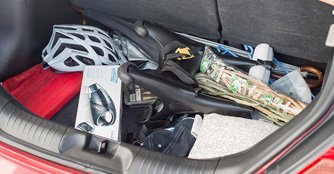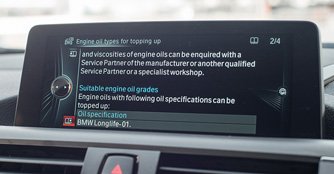Five sure-fire ways to improve your car's fuel economy
07 Jun 2016|91,277 views
One of the many gripes that Singaporean drivers have is the price of petrol. With prices at around $2 per litre and above, it's understandable that maximising fuel economy is one of the foremost concerns on drivers' minds.
There are numerous ways to improve your car's fuel economy and hence lighten the hurt on your wallet. Of course, there are costly ways to go about this, such as tuning your engine for maximum efficiency, or engaging in 'hypermiling' tactics.
However, most of us drivers may not be willing to go to such extents. Here, we look at five simple, cost-effective and sure-fire ways to improve your car's fuel economy.
1. Remove unnecesary junk from the car
One of the biggest culprits of killing your car's fuel economy is weight, specifically unecessary weight. A cursory glance around any car will almost certainly reveal pieces of junk/equipment that don't need to be there. The easiest and simplest thing you can do is to conduct a simple spring cleaning of your vehicle and remove all the junk that you don't need. You will be surprised at just how much weight you can save by doing this. Of course, once you do clear out your rubbish, be conscientious in making sure that it doesn't build up again.

 All that junk in the boot isn't improving rear wheel downforce, it's just hurting your car's fuel economy
All that junk in the boot isn't improving rear wheel downforce, it's just hurting your car's fuel economy
2. Use the car's start/stop function
Most modern cars these days come with a start/stop function, and while it may be slightly annoying or intrusive, you should certainly use it. By shutting off the engine while your car idles, you will save precious amounts of fuel.
3. Ensure tyres are inflated to the recommended pressure
We suspect most drivers don't check their tyres' pressure as often as they probably should. Properly inflated tyres ensure the least rolling resistance, without compromising the tyres' stability and grip. You should check your tyre pressure at least once every fortnight. And yes, while some people may be inclined to over-inflate the tyres, but we would not suggest compromising the tyres' grip, for safety reasons.
There are numerous ways to improve your car's fuel economy and hence lighten the hurt on your wallet. Of course, there are costly ways to go about this, such as tuning your engine for maximum efficiency, or engaging in 'hypermiling' tactics.
However, most of us drivers may not be willing to go to such extents. Here, we look at five simple, cost-effective and sure-fire ways to improve your car's fuel economy.
1. Remove unnecesary junk from the car
One of the biggest culprits of killing your car's fuel economy is weight, specifically unecessary weight. A cursory glance around any car will almost certainly reveal pieces of junk/equipment that don't need to be there. The easiest and simplest thing you can do is to conduct a simple spring cleaning of your vehicle and remove all the junk that you don't need. You will be surprised at just how much weight you can save by doing this. Of course, once you do clear out your rubbish, be conscientious in making sure that it doesn't build up again.

2. Use the car's start/stop function
Most modern cars these days come with a start/stop function, and while it may be slightly annoying or intrusive, you should certainly use it. By shutting off the engine while your car idles, you will save precious amounts of fuel.
3. Ensure tyres are inflated to the recommended pressure
We suspect most drivers don't check their tyres' pressure as often as they probably should. Properly inflated tyres ensure the least rolling resistance, without compromising the tyres' stability and grip. You should check your tyre pressure at least once every fortnight. And yes, while some people may be inclined to over-inflate the tyres, but we would not suggest compromising the tyres' grip, for safety reasons.
4. Use the recommended engine oil grade
All car engines are different, and function most efficiently with different grades of engine oil. Using the recomended grade ensures the engine functions at its optimal level. By not over-working your engine, and allowing it to perform the way it is designed to, you will actually also save fuel. Also be sure to check your engine oil level regularly, to ensure that the mechanical parts are well-lubricated and operating at optimum efficiency.
5. Use the right tyres
Generally, narrower tyres equate to lesser rolling resistance, and it may be tempting to consider just fitting narrower tyres on your car. However, different cars (and especially with different body types) place different demands on the tyres, and hence it is important that when you do have to change tyres, make sure they are the same as the vehicle's original equipment tyre size. Again, the key here is optimisation, to allow your vehicle to run as it is designed to.
Are there other ways to get more mileage out of a single tank of petrol? Of course there are. Here are some other suggestions you may want to consider:
Avoid start-stop traffic whenever possible. Yes, we realise this is proably easier said than done, given the number of cars and traffic lights on our roads. However, planning ahead can go some way to reduce being stuck in bad traffic.
Make sure to keep to your servicing schedule. During servicing, be sure to also check the air filter, and clean/change it when necessary. Once it clogs up, your engine has a harder time sucking air through it. To compensate for the reduced airflow, the engine management system will richen up the mixture, using more petrol to keep the engine running smoothly.
Use cruise control, if your car has it. Last but not least, drive efficiently. Being light on the throttle and minimising hard braking can go a long way to improving your car's km/L figures. How then does one become a more efficient driver? Well, that may just be another article all in itself. So stay tuned!
Here are some related articles that might interest you
7 ways to reduce running costs
Latest petrol prices in Singapore - Compare prices across all companies here
6 types of car performance modifications to make your car faster on the track
Here's how you can improve your engine's fuel consumption and performance
12 hybrid cars you can buy in Singapore that will save your wallet
All car engines are different, and function most efficiently with different grades of engine oil. Using the recomended grade ensures the engine functions at its optimal level. By not over-working your engine, and allowing it to perform the way it is designed to, you will actually also save fuel. Also be sure to check your engine oil level regularly, to ensure that the mechanical parts are well-lubricated and operating at optimum efficiency.
5. Use the right tyres
Generally, narrower tyres equate to lesser rolling resistance, and it may be tempting to consider just fitting narrower tyres on your car. However, different cars (and especially with different body types) place different demands on the tyres, and hence it is important that when you do have to change tyres, make sure they are the same as the vehicle's original equipment tyre size. Again, the key here is optimisation, to allow your vehicle to run as it is designed to.
Are there other ways to get more mileage out of a single tank of petrol? Of course there are. Here are some other suggestions you may want to consider:
Avoid start-stop traffic whenever possible. Yes, we realise this is proably easier said than done, given the number of cars and traffic lights on our roads. However, planning ahead can go some way to reduce being stuck in bad traffic.
Make sure to keep to your servicing schedule. During servicing, be sure to also check the air filter, and clean/change it when necessary. Once it clogs up, your engine has a harder time sucking air through it. To compensate for the reduced airflow, the engine management system will richen up the mixture, using more petrol to keep the engine running smoothly.
Use cruise control, if your car has it. Last but not least, drive efficiently. Being light on the throttle and minimising hard braking can go a long way to improving your car's km/L figures. How then does one become a more efficient driver? Well, that may just be another article all in itself. So stay tuned!
Here are some related articles that might interest you
7 ways to reduce running costs
Latest petrol prices in Singapore - Compare prices across all companies here
6 types of car performance modifications to make your car faster on the track
Here's how you can improve your engine's fuel consumption and performance
12 hybrid cars you can buy in Singapore that will save your wallet
One of the many gripes that Singaporean drivers have is the price of petrol. With prices at around $2 per litre and above, it's understandable that maximising fuel economy is one of the foremost concerns on drivers' minds.
There are numerous ways to improve your car's fuel economy and hence lighten the hurt on your wallet. Of course, there are costly ways to go about this, such as tuning your engine for maximum efficiency, or engaging in 'hypermiling' tactics.
However, most of us drivers may not be willing to go to such extents. Here, we look at five simple, cost-effective and sure-fire ways to improve your car's fuel economy.
1. Remove unnecesary junk from the car
One of the biggest culprits of killing your car's fuel economy is weight, specifically unecessary weight. A cursory glance around any car will almost certainly reveal pieces of junk/equipment that don't need to be there. The easiest and simplest thing you can do is to conduct a simple spring cleaning of your vehicle and remove all the junk that you don't need. You will be surprised at just how much weight you can save by doing this. Of course, once you do clear out your rubbish, be conscientious in making sure that it doesn't build up again.

 All that junk in the boot isn't improving rear wheel downforce, it's just hurting your car's fuel economy
All that junk in the boot isn't improving rear wheel downforce, it's just hurting your car's fuel economy
2. Use the car's start/stop function
Most modern cars these days come with a start/stop function, and while it may be slightly annoying or intrusive, you should certainly use it. By shutting off the engine while your car idles, you will save precious amounts of fuel.
3. Ensure tyres are inflated to the recommended pressure
We suspect most drivers don't check their tyres' pressure as often as they probably should. Properly inflated tyres ensure the least rolling resistance, without compromising the tyres' stability and grip. You should check your tyre pressure at least once every fortnight. And yes, while some people may be inclined to over-inflate the tyres, but we would not suggest compromising the tyres' grip, for safety reasons.
There are numerous ways to improve your car's fuel economy and hence lighten the hurt on your wallet. Of course, there are costly ways to go about this, such as tuning your engine for maximum efficiency, or engaging in 'hypermiling' tactics.
However, most of us drivers may not be willing to go to such extents. Here, we look at five simple, cost-effective and sure-fire ways to improve your car's fuel economy.
1. Remove unnecesary junk from the car
One of the biggest culprits of killing your car's fuel economy is weight, specifically unecessary weight. A cursory glance around any car will almost certainly reveal pieces of junk/equipment that don't need to be there. The easiest and simplest thing you can do is to conduct a simple spring cleaning of your vehicle and remove all the junk that you don't need. You will be surprised at just how much weight you can save by doing this. Of course, once you do clear out your rubbish, be conscientious in making sure that it doesn't build up again.

2. Use the car's start/stop function
Most modern cars these days come with a start/stop function, and while it may be slightly annoying or intrusive, you should certainly use it. By shutting off the engine while your car idles, you will save precious amounts of fuel.
3. Ensure tyres are inflated to the recommended pressure
We suspect most drivers don't check their tyres' pressure as often as they probably should. Properly inflated tyres ensure the least rolling resistance, without compromising the tyres' stability and grip. You should check your tyre pressure at least once every fortnight. And yes, while some people may be inclined to over-inflate the tyres, but we would not suggest compromising the tyres' grip, for safety reasons.
4. Use the recommended engine oil grade
All car engines are different, and function most efficiently with different grades of engine oil. Using the recomended grade ensures the engine functions at its optimal level. By not over-working your engine, and allowing it to perform the way it is designed to, you will actually also save fuel. Also be sure to check your engine oil level regularly, to ensure that the mechanical parts are well-lubricated and operating at optimum efficiency.
5. Use the right tyres
Generally, narrower tyres equate to lesser rolling resistance, and it may be tempting to consider just fitting narrower tyres on your car. However, different cars (and especially with different body types) place different demands on the tyres, and hence it is important that when you do have to change tyres, make sure they are the same as the vehicle's original equipment tyre size. Again, the key here is optimisation, to allow your vehicle to run as it is designed to.
Are there other ways to get more mileage out of a single tank of petrol? Of course there are. Here are some other suggestions you may want to consider:
Avoid start-stop traffic whenever possible. Yes, we realise this is proably easier said than done, given the number of cars and traffic lights on our roads. However, planning ahead can go some way to reduce being stuck in bad traffic.
Make sure to keep to your servicing schedule. During servicing, be sure to also check the air filter, and clean/change it when necessary. Once it clogs up, your engine has a harder time sucking air through it. To compensate for the reduced airflow, the engine management system will richen up the mixture, using more petrol to keep the engine running smoothly.
Use cruise control, if your car has it. Last but not least, drive efficiently. Being light on the throttle and minimising hard braking can go a long way to improving your car's km/L figures. How then does one become a more efficient driver? Well, that may just be another article all in itself. So stay tuned!
Here are some related articles that might interest you
7 ways to reduce running costs
Latest petrol prices in Singapore - Compare prices across all companies here
6 types of car performance modifications to make your car faster on the track
Here's how you can improve your engine's fuel consumption and performance
12 hybrid cars you can buy in Singapore that will save your wallet
All car engines are different, and function most efficiently with different grades of engine oil. Using the recomended grade ensures the engine functions at its optimal level. By not over-working your engine, and allowing it to perform the way it is designed to, you will actually also save fuel. Also be sure to check your engine oil level regularly, to ensure that the mechanical parts are well-lubricated and operating at optimum efficiency.
5. Use the right tyres
Generally, narrower tyres equate to lesser rolling resistance, and it may be tempting to consider just fitting narrower tyres on your car. However, different cars (and especially with different body types) place different demands on the tyres, and hence it is important that when you do have to change tyres, make sure they are the same as the vehicle's original equipment tyre size. Again, the key here is optimisation, to allow your vehicle to run as it is designed to.
Are there other ways to get more mileage out of a single tank of petrol? Of course there are. Here are some other suggestions you may want to consider:
Avoid start-stop traffic whenever possible. Yes, we realise this is proably easier said than done, given the number of cars and traffic lights on our roads. However, planning ahead can go some way to reduce being stuck in bad traffic.
Make sure to keep to your servicing schedule. During servicing, be sure to also check the air filter, and clean/change it when necessary. Once it clogs up, your engine has a harder time sucking air through it. To compensate for the reduced airflow, the engine management system will richen up the mixture, using more petrol to keep the engine running smoothly.
Use cruise control, if your car has it. Last but not least, drive efficiently. Being light on the throttle and minimising hard braking can go a long way to improving your car's km/L figures. How then does one become a more efficient driver? Well, that may just be another article all in itself. So stay tuned!
Here are some related articles that might interest you
7 ways to reduce running costs
Latest petrol prices in Singapore - Compare prices across all companies here
6 types of car performance modifications to make your car faster on the track
Here's how you can improve your engine's fuel consumption and performance
12 hybrid cars you can buy in Singapore that will save your wallet



















